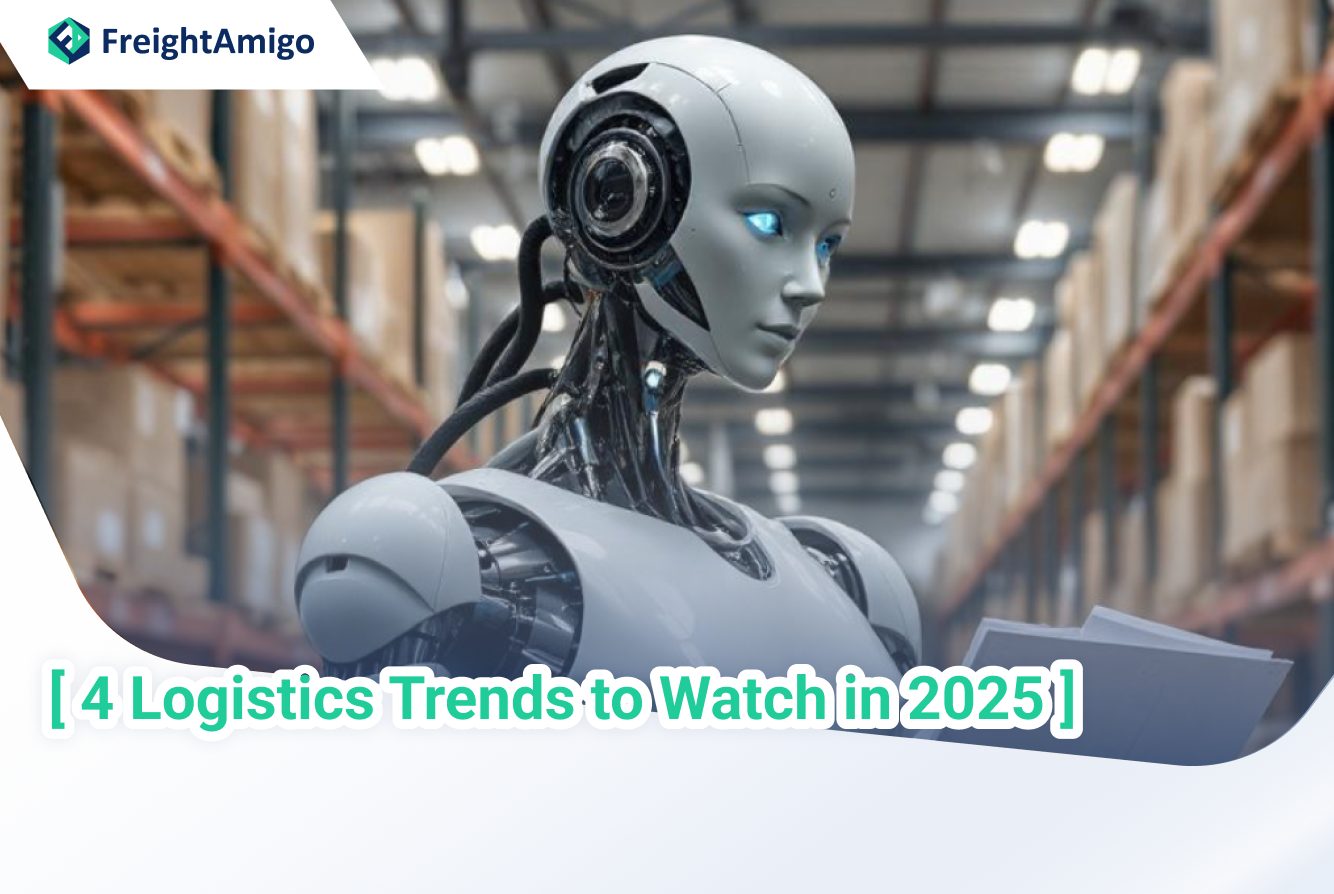4 Logistics Trends to Watch in 2025
Latest update on 11 Nov, 2024 by Vanessa Tam – Marketing Analyst at FreightAmigo
As we approach 2025, the logistics industry is on the brink of transformative changes driven by technological advancements, evolving consumer demands, and a growing emphasis on sustainability. Here are four key trends that are set to shape the future of logistics, focusing on warehouse automation, artificial intelligence (AI), big data, and green logistics.
Want to Instantly Compare International Express, Air, Sea, Rail Freight And Truck Logistics Management Solutions To Control Transportation Costs?
1. Warehouse Automation: Redefining Efficiency
Warehouse automation is rapidly becoming a cornerstone of modern logistics. With the increasing pressure for faster deliveries and reduced operational costs, companies are investing heavily in automated solutions to streamline their warehouse operations.
Robotics and Autonomous Vehicles
Robots are taking on various tasks within warehouses, from picking and packing to sorting and inventory management. Autonomous mobile robots (AMRs) are increasingly used to transport goods within facilities, reducing the need for manual labor and minimizing human error. By 2025, we expect to see a significant rise in the use of collaborative robots (cobots) that work alongside human workers, enhancing productivity while ensuring safety.
Automated Storage and Retrieval Systems (AS/RS)
Automated storage and retrieval systems (AS/RS) are also gaining traction. These systems utilize robotic shuttles to store and retrieve goods efficiently, optimizing space utilization and speeding up order fulfillment processes. With the integration of AI and machine learning, AS/RS can adapt to changing inventory levels and demand patterns, ensuring that warehouses remain agile and responsive.
Benefits of Automation
The benefits of warehouse automation are clear: reduced labor costs, increased accuracy, improved safety, and enhanced scalability. As companies look to meet the demands of e-commerce and just-in-time delivery, automation will play a crucial role in maintaining competitive advantage.
2.The Rise of Artificial Intelligence
Artificial intelligence is revolutionizing logistics by enabling smarter decision-making and enhancing operational efficiency. By 2025, AI will be an integral part of logistics operations, driving innovations across various functions.
Predictive Analytics
AI-powered predictive analytics will allow logistics companies to forecast demand more accurately. By analyzing historical data, market trends, and external factors, AI can help businesses anticipate fluctuations in demand and optimize inventory levels accordingly. This capability will be particularly valuable in managing seasonal trends and unexpected spikes in demand.
Route Optimization
AI algorithms will also optimize transportation routes, reducing fuel consumption and delivery times. By considering real-time traffic data, weather conditions, and delivery schedules, AI can generate the most efficient routes for drivers, leading to cost savings and improved service levels.
Enhanced Customer Experience
AI will enhance the customer experience by providing personalized service. Chatbots and virtual assistants will handle customer inquiries, offer real-time tracking information, and manage returns, ensuring that customer needs are met promptly and efficiently.
3.Harnessing the Power of Big Data
Big data is a game-changer for the logistics industry, providing valuable insights that drive strategic decision-making. By 2025, we will see a more widespread adoption of big data analytics in logistics, allowing companies to harness vast amounts of information for better outcomes.
Data-Driven Decision Making
Logistics companies will increasingly rely on data-driven decision-making to enhance operational efficiency. By analyzing data from various sources, including supply chain partners, market trends, and customer behavior, businesses can identify inefficiencies, optimize processes, and reduce costs.
Real-Time Visibility
Big data will also enable real-time visibility across the supply chain. Companies will leverage IoT devices and sensors to gather data on inventory levels, shipment status, and environmental conditions. This visibility will empower logistics providers to make informed decisions, respond quickly to disruptions, and enhance overall supply chain resilience.
Risk Management
Moreover, big data analytics will play a critical role in risk management. By analyzing historical data and real-time information, logistics companies can identify potential risks and develop contingency plans, ensuring business continuity in the face of unexpected challenges.
4. Green Logistics: A Sustainable Future
As environmental concerns become increasingly pressing, green logistics is emerging as a key trend in the industry. By 2025, sustainability will no longer be a choice but a necessity for logistics companies aiming to meet regulatory requirements and consumer expectations.
Electrification of Fleets
One of the most significant shifts will be the electrification of transportation fleets. Many logistics companies are investing in electric vehicles (EVs) to reduce carbon emissions and lower operating costs. By 2025, we can expect to see a substantial increase in the adoption of EVs for last-mile deliveries, driven by advancements in battery technology and expanding charging infrastructure.
Sustainable Packaging Solutions
Sustainable packaging will also gain prominence as companies seek to minimize waste. The shift away from single-use plastics toward biodegradable and reusable materials will be a key focus. By 2025, we anticipate that sustainable packaging solutions will become standard practice, enhancing brand reputation and meeting consumer demand for eco-friendly options.
Circular Economy Practices
The concept of a circular economy is gaining traction in logistics. Companies are rethinking their supply chains to promote the reuse, repair, and recycling of products. By implementing reverse logistics systems, businesses can efficiently manage product returns and minimize waste, contributing to a more sustainable future.
Conclusion
As we look toward 2025, the logistics industry is poised for significant transformation driven by warehouse automation, artificial intelligence, big data, and green logistics. Companies that embrace these trends will not only enhance their operational efficiency but also meet the evolving expectations of consumers and regulatory requirements.
The future of logistics is not just about moving goods; it’s about creating a sustainable and customer-centric supply chain that leverages advanced technologies to deliver exceptional service. Embracing these trends will be crucial for logistics companies aiming to thrive in an increasingly complex and competitive landscape.
FreightAmigo, as a one-stop logistics platform, provides you with safe and professional logistics services:
Instant Quotation: FreightAmigo utilizes AI technology to quickly compare costs and delivery times for different transportation options, optimizing routes and shortening delivery times, helping small and medium-sized enterprises, e-commerce businesses, and companies make the best logistics decisions.
Track & Trace : AmiGo Trucking combines cutting-edge artificial intelligence technology to provide customers with real-time location tracking and instant monitoring of delivery progress, allowing customers to access live shipping data and feel assured about their shipments.
Green Logistics Technology: AmiGo Green helps businesses reduce the carbon footprint generated by shipping activities, making it easier for companies to achieve their ESG-related operational goals.
FreightAmigo Shopify App: Integrate your Shopify store with our logistics platform to sync order information in real time. Manage orders and generate shipping labels from a single platform, fully integrating shipping arrangements, simplifying your online store’s logistics while shipping at the most competitive rates.
If you are looking for logistics experts, please visit FreightAmigo Page
Read More:
Future of Ecommerce Logistics: Innovations and Challenges
Navigating the Logistics Landscape: A Comprehensive Guide to Shipping from China to New York Seaport
Using Technology to Streamline Peak Season Fulfillment
If you have any inquiries on logistics / supply chain, feel free to contact FreightAmigo now:
Chat with us online | Hotline: +852 28121686 | WhatsApp: +852 27467829









































